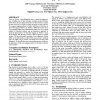Free Online Productivity Tools
i2Speak
i2Symbol
i2OCR
iTex2Img
iWeb2Print
iWeb2Shot
i2Type
iPdf2Split
iPdf2Merge
i2Bopomofo
i2Arabic
i2Style
i2Image
i2PDF
iLatex2Rtf
Sci2ools
105
click to vote
HT
2010
ACM
2010
ACM
Conversational tagging in twitter
Users on Twitter, a microblogging service, started the phenomenon of adding tags to their messages sometime around February 2008. These tags are distinct from those in other Web 2.0 systems because users are less likely to index messages for later retrieval. We compare tagging patterns in Twitter with those in Delicious to show that tagging behavior in Twitter is different because of its conversational, rather than organizational nature. We use a mixed method of statistical analysis and an interpretive approach to study the phenomenon. We find that tagging in Twitter is more about filtering and directing content so that it appears in certain streams. The most illustrative example of how tagging in Twitter differs is the phenomenon of the Twitter micro-meme: emergent topics for which a tag is created, used widely for a few days, then disappears. We describe the micro-meme phenomenon and discuss the importance of this new tagging practice for the larger real-time search context. Categor...
HT 2010 | Twitter | Twitter Differs | Web 2.0 Systems |
Related Content
| Added | 10 Jul 2010 |
| Updated | 21 Jul 2010 |
| Type | Conference |
| Year | 2010 |
| Where | HT |
| Authors | Jeff Huang, Katherine M. Thornton, Efthimis N. Efthimiadis |
Comments (0)



